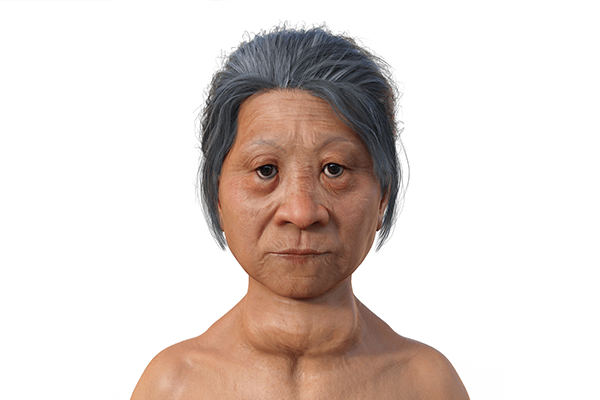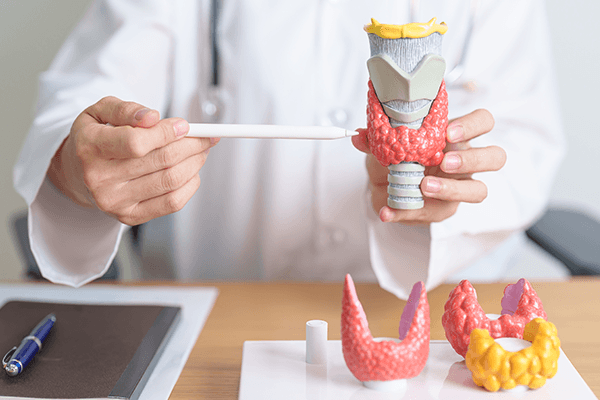Let's Explore Various Thyroid Disorders!

Thyroid diseases occur due to disturbances in the thyroid gland. The thyroid gland is a small butterfly-shaped organ located in the front of the neck. In Indonesia, thyroid disorders rank second among the most prevalent metabolic diseases, following diabetes mellitus.
When a person has a thyroid issue, their thyroid gland either produces too little or too much thyroid hormone. Every day, the thyroid gland produces thyroxine and triiodothyronine hormones, which control various metabolic functions in the body, such as heart rate, menstrual cycle, weight, muscle strength, body temperature, and cholesterol.
When the thyroid gland is disrupted, the body faces difficulty regulating various activities, leading to symptoms such an irregular heartbeat, fatigue, significant weight changes, menstrual disturbances, and more.
Thyroid disorders come in various forms. Let's delve into each one.
1. Graves' disease

This disease arises because the thyroid gland overproduces thyroid hormones. Grave’s diseases can cause a variety of symptoms such as a faster or irregular heartbeat, weight loss, hair loss, diarrhea, insomnia, fatigue, and tremors in the hands or fingers.
Graves' disease is more commonly experienced by women, and people younger than 40. Women with this disease often change their menstrual cycles, including late periods. In men, it can lead to erectile dysfunction.
Some graves’ patients exhibit distinctive symptoms due to inflammation or immune system disorders affecting the muscles and tissues around the eyes. These symptoms include bulging eyes, reddened and inflamed eyes, light sensitivity, double vision, and vision loss.
In rare cases, graves’ patients may also experience skin problems in the shins and ankles, with the skin appearing red and thickened, like orange peel.
Treatment for graves' disease can involve various methods, including radioactive iodine therapy. However, this therapy is not recommended for graves' patients with muscle or eye tissue disorders.
2. Hashimoto's disease

Hashimoto's is caused by inflammation of the thyroid gland, resulting in the production of too little thyroid hormone. This inflammation leads to swelling in the thyroid gland, causing difficulty swallowing and a feeling of fullness in the throat.
While it can affect anyone, women aged 30–50 are at a higher risk. Having a family history of the disease, high iodine consumption, and past radiation exposure are risk factors.
Hashimoto's patients may experience symptoms such as fatigue, constipation, sudden weight gain, joint pain and stiffness, enlargement of the tongue, and irregular or excessive menstrual bleeding.
Treatment includes hormone therapy involving synthetic thyroid hormones, along with lifestyle and dietary changes.
3. Goiter

Goiter is characterized by swelling in the front of the neck, ranging from small to very large. Symptoms include difficulty swallowing or breathing, coughing, hoarseness, or dizziness when raising the arms above the head.
The main cause of this condition is iodine deficiency, although excessive consumption of certain foods, such as spinach, soybeans, broccoli, cabbage, kale, and peanuts, can also trigger goiter.
4. Thyroid nodules

Solid or fluid-filled nodules may appear in the thyroid, causing swelling. These nodules are often non-cancerous and are frequently discovered during imaging procedures such as CT scans or MRI scans.
5. Thyroid cancer

Thyroid cancer is a rare type of cancer, occurring more frequently in women. In the early stages, thyroid cancer may not show symptoms. In advanced stages, symptoms include persistent coughing, neck pain, a sore throat, and a hoarse voice. Treatment involves surgical removal of the thyroid, either partially or entirely, followed by hormone replacement therapy.
These are various thyroid disorders that we need to be aware of. If you feel suspicious symptoms, consult with a healthcare professional for proper diagnosis and management.
The impact of thyroid disorders
In women, both hyperthyroidism and hypothyroidism can affect fertility. Thyroid hormones can disrupt the balance of estrogen hormones that regulate ovulation.
Thyroid disorders can also impact mood, such as anxiety or depression. Generally, the more severe the thyroid disease, the more pronounced the mood swings.
Detecting thyroid disorders early is beneficial for treatment. Therefore, it is important to be aware of what is happening to our bodies.
Here are some things we can do at home to identify thyroid disorders:
- Get a mirror and a glass of water.
- Tilt your head back and observe the area of your neck where the thyroid is located (thyroid cartilage).
- Take a drink of water while watching the thyroid cartilage.
- Repeat the swallowing motion while palpating the lower part of the thyroid cartilage.
- Observe if there is a lump or swelling.
Repeat this test several times. Don’t self-diagnose. You have to contact a doctor to determine the correct diagnosis.



